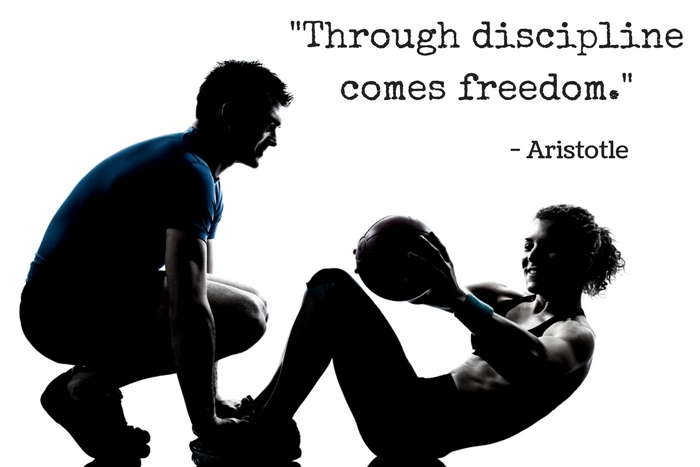Discipline Equals Freedom – A Winning Equation

It’s one of those counterintuitive ideas that when you first think about it might not make sense.
Discipline equals Freedom. It’s one of the key principles for success highlighted in the fantastic leadership book ‘Extreme Ownership’ written by a couple of Navy SEALs last year. But it’s not a new idea.
Aristotle said it this way a long time ago:
“Through discipline comes freedom.”
And more recently author Anne Lamott said this:
“All freedom comes from discipline.”
But discipline is rigid. Discipline is hard work and saying ‘no’ to things. Discipline is all about holding true to the straight and narrow – so how can that possibly lead to freedom?
What is freedom?
According to the first definition that I found on Google… freedom is:
“the power or right to act, speak, or think as one wants without hindrance or restraint.”
It’s generally true that you can do anything you want as long as it doesn’t hurt someone else, it’s not illegal and if you’re capable of it (i.e. dunking a basketball). However, that doesn’t mean there won’t be consequences from your choices – as the father of two teenagers, I get the chance to talk about consequences a lot and while my kids could technically choose to stay out all night and not let us know what they’re doing, there would be consequences to that choice. They would find a distinct lack of freedom in their future should they choose that option. If they want long-term freedom, they know they’ll have to earn it – we’ll extend their curfew and give them additional leeway once they’ve proven they can handle the responsibility and challenges without any issues.
In other words, they’ll have to apply discipline to their behavior to earn that longer-term freedom.
What do you want?
Let’s apply this idea to some other scenarios. Let’s say that you want to run a 5-minute mile. Unless you’re a fit athlete, it’s not likely you can just bust out a 5-minute mile time (absent someone chasing you), but assuming that you have the physical potential for that kind of time, you could get there by practicing diligently, getting into shape and improving your speed.
Your discipline would improve your capabilities which would allow you to do a lot more things, including eventually running a 5-minute mile.
What if you wanted to spend more time hanging out watching cat videos? Assuming that you don’t want to lose your job, then your best bet is to be more productive during your workday (get more done). A proven way to do this would be to identify the things that you do that make the most impact on your success (80/20 rule – high priority activities) and then focus your time and effort on those things. That’s only going to happen through applied discipline which will help you to eventually create new, more productive habits (and get more done).
Discipline will enable you to narrow your focus and concentrate your efforts on those tasks that make the most impact. You’ll get more done Once you build up your productivity muscles, you’ll have the freedom to do more (or do the same amount in less time, freeing up your time to watch more cat videos…).
What if you wanted your team to have a bigger impact on the company as a whole? Again it’s about being more productive so you can (collectively) do more. One of the best ways to improve a team’s efficiency is to come up with clear, repeatable processes for all of the recurring work that your team does every day/week/month. Following a process with clear responsibilities doesn’t sound much like freedom – but what you’ll realize after you implement a process is that the structure actually frees you up to do more interesting work because the basic, fundamental stuff is handled.
It definitely takes discipline for you (and your team) to develop and document repeatable processes, but that discipline will be rewarded with a more efficient team that can start spending time on the more complex (and more rewarding) challenges that you likely face.
The bottom line is that freedom actually comes from capabilities. The more you know, the more you can do, the more options you have – which is when things become fun. Someone who’s brand new to a job doesn’t know much and they haven’t developed any skills in the day to day functions they’re responsible for. They have limited freedom because most of their time is going to be spent just understanding what’s going on and reacting. Freedom comes from mastering the skills and knowledge you need – and that comes from applied discipline of making yourself better.
What do you think? Do you agree that discipline equals freedom? Are you consistently trying to get better and learn more about what you’re doing? If not, you might want to try that – it will free you up immensely! We’d love to hear your thoughts – share them below.
Shawn Kinkade Kansas City Business Coach
